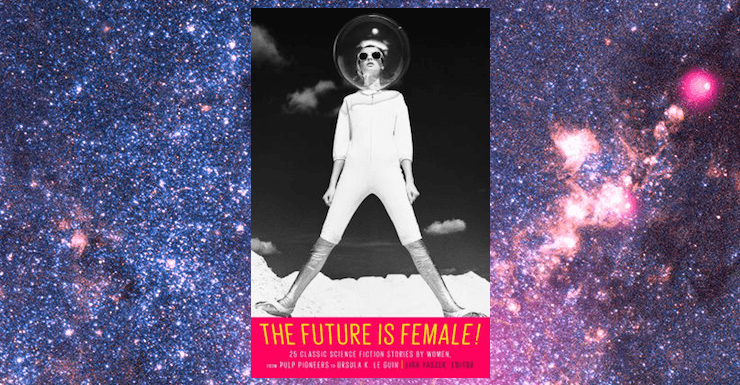The Future is Female! is a historically-oriented anthology collecting sf written by women that spans from the early pulps to the cusp of the New Wave. All but one of the stories included were originally published in contemporary magazines, an editorial choice emphasizing the fact that women have from the start been major commentators, taste-makers, and artists within genre fiction. These stories also illustrate that the field has contained speculation on the social sciences, on gender and race and culture, from its inception. After all, to speculate is to ask “what next?” and the moment of answer is inherently political. Yaszek’s efforts here fill in a historical gap and offer an argument at the same time.
As she explains in her introduction, she sought to collect pieces from American women writing from “the launch of the first specialist genre magazines in the 1920s” up to “the emergence of self-identified feminist sf in the 1970s.” The table of contents is arranged chronologically, charting out that evolution and the conversation between the stories included. The earliest, Clare Winger Harris’s “Miracle of the Lily,” is from 1928; the latest stories are a set of four from 1967-1969 that offer a stunning and pointed signoff: Kate Wilhem’s “Baby, You Were Great,” Joanna Russ’s “The Barbarian,” James Tiptree Jr.’s “The Last Flight of Dr. Ain,” and Ursula K. Le Guin’s “Nine Lives.”
The path a reader takes over this forty years of short fiction contains an argument, created one story to the next, one juxtaposition against another. Yaszek’s editorial choices are not made in a vacuum, particularly given ongoing reactionary movements directed at denigrating and minimizing the presence of women within the field. The editorial project here therefore serves two purposes. The first, as it says in the introduction, is to collect for representation and posterity a survey of the kinds of stories women were publishing in media res with men in the magazines that built sf. Their existence alone is relevant. The second is more implicit and comes through reading the stories themselves—after all, twenty-five pieces to represent forty years ain’t much, so which stories were chosen is where it gets interesting on a theoretical level.
The Future is Female! leans toward sociological and humanistic stories as well as stories that pushed at the boundaries of style and experimentation. The common critical narrative of sf as “big ideas and pulp action” that then evolved into “New Wave postmodernism” is simplistic and, as with any set of categories, useful more as a sketch than a hard rule. Yaszek’s selections here show the drive toward liminality, experiment, and the political from first to last. This project is also important because even in critical circles we often start conversations of feminist sf with the New Wave—Russ and Le Guin, for example—without much attention to the half-century of writers who came before them. I’ll own it: in the course on queer sf I’ve taught in the past, my starting texts are from the late sixties where this collection stops.
While the late sixties/early seventies were the moment of explosion, the pressure was consistent and evolving beforehand. Yaszek includes stories that are harsh and vibrant in their criticism of gender roles, patriarchal abuse, capitalism, overpopulation, pollution, nuclear war, racism, and media. The science of sf is as broad in these pulp stories as it is in magazines published this month. The Russ story, for example, is one of her Alyx pieces—and it’s science-fantasy as Russ often did so very well. I appreciate that choice, too, to end with four pieces by writers who damn well stood the test of time to show that this is where it’s always been going and that women’s contributions have always been important.
Though a contemporary criticism must be made about stories that use aliens as metaphors for race (and about how that can be quite literally alienating and problematic in and of itself), Yaszek’s inclusion of several pieces that deal explicitly with American anti-blackness and racism through fantastical lenses is historically relevant. Again, in our current moment, seeing the fights we’re seeing and the reactionary racism that undergirds them within sf and genre fiction more broadly, the historical proof that speculative fiction concerned with racial justice has always existed is important. The execution is sometimes more along the lines of “product of its time,” but the contextual importance of race as a consistent concern for sf writers is hard to understate.
For example, Leigh Brackett’s “All the Colors of the Rainbow” was published in 1957, two years following Rosa Parks’ protest and in the thick of the early Civil Rights movement. She was not writing about something that happened in the past but a real concern of her present. It is clearly aimed at a white audience and written by a white woman in its depiction of the assault of an alien couple in a sundown town (who are abused verbally and physically using racial slurs, as a fair warning for readers who will be picking up the book)—but Brackett uses the tropes of sf to address an audience about an issue of horrific injustice in the world at that moment. Political consciousness isn’t a new development in genre fiction, and it wasn’t new in the New Wave, either.
Buy the Book


The Future is Female! 25 Classic Science Fiction Stories by Women, from Pulp Pioneers to Ursula K. Le Guin
However, there is a significant misstep in The Future is Female!: the inclusion of “Another Rib” by John Jay Wells (pseud. for Juanita Coulson) and Marion Zimmer Bradley. I am of two minds on this: on the one hand, it’s a retrospective, and I can see the functional/historicist argument for not excluding a major author. On the other, in this case, perhaps that would be best—particularly given the tone of the story actually chosen. Yaszek notes Bradley’s involvement in child sexual abuse in the biographical section, and frankly that is insufficient, but given the content of “Another Rib” the choice to include the piece is mind-boggling. There are twenty-five slots in this collection and hundreds upon hundreds of viable stories. I find it disappointing and poisonous that a primary story handling queerness in this anthology is by Bradley, especially given that it deals with coerced gender reassignment surgery where nubile, more “feminine” men become the bearers of children for older, more masculine men to the horror of an everyman protagonist. There’s the art and the artist, but when the art reflects the beliefs of the artist, why on earth are we praising it even implicitly?
The taste “Another Rib” left in my mouth was foul, and there are far greater and more representative pieces of sf dealing with gender and reproduction and queerness popping up in the mid-sixties. As a queer reader it is, honestly, almost enough to destabilize my appreciation of the entire project’s political impetus, as it seems Yaszek either missed or purposefully included the implications of “Another Rib” surrounding queer male relationships (in a piece written by women!). The best interpretation I have is that the intent was to point to the surface level commentary on the protagonist’s homophobia being “wrong,” but even then, the story supports him more than it doesn’t and treats male queerness with a miasmic balance of fetish and horror that I could do without encountering in an otherwise delightful, politically oriented collection. Without spending an entire separate essay on homophobic tropes surrounding men’s desire and queerness, suffice to say that this story both as a story and as an editorial choice undermines the project as a whole. I’m baffled by its inclusion, and by the fact that Yaszek—even if she felt some completist urge to represent this moment within the field—did not note that explicitly in her editorial comments.
The Future is Female! does fill in a publication gap with proof-positive of the progressive drive of sf from the pulps onward, and that contribution is valuable. While there are editorial choices I’m uncomfortable with, overall it is a coherent and useful text that flows well and has a solid structure. Yaszek makes a thorough implicit argument about the nature of genre fiction that rebuffs claims both against women’s place within it and against the inherently political nature of speculation. For that, I approve of it. It’s also a rare look at the skill and quality of stories published in the earlier pulp magazines that are often brushed past in the run-up to the New Wave. Choosing to end with luminaries like Russ, Le Guin, Tiptree and Wilhelm also gives the collection an eager, uplifting sense of continued growth—and that’s where I’ll leave it as well.
The Future is Female! is available from Library of America.










